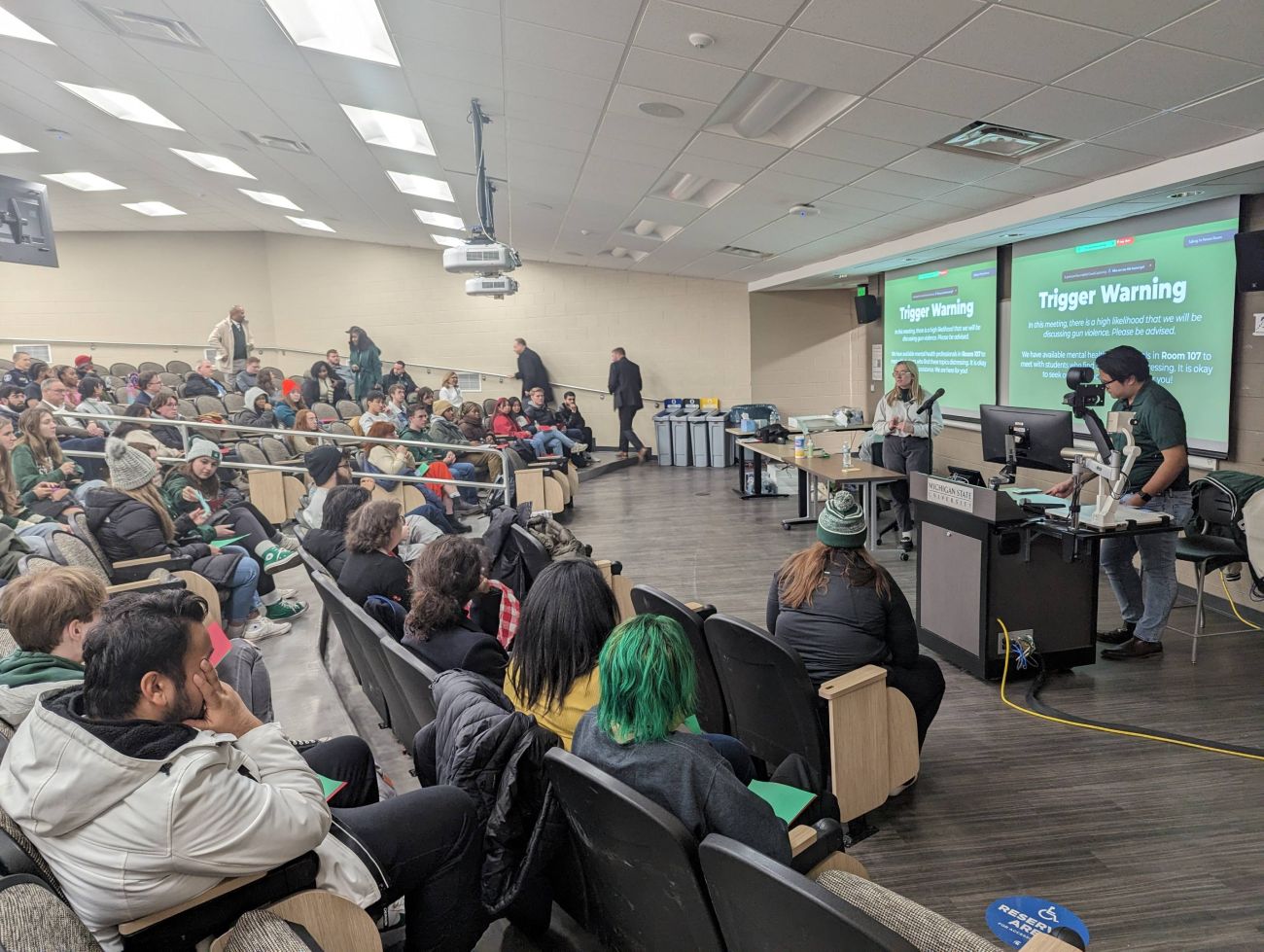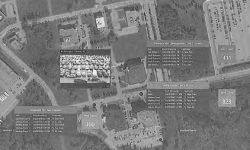Michigan State students demand tougher security at emotional town hall

- Dozens of MSU students demand heightened security and more time before resuming classes
- The event was the first of several town halls to allow students to voice concerns to school administrators
- Most speakers called for door locks, key card entries and flexible attendance and grading policies
[Editor’s note: This article includes accounts from MSU students about the mass shooting that took place on campus on Feb. 13]
EAST LANSING — When she learned a shooter was roaming at large on the Michigan State University campus last week, Maeve Denshaw realized she could not lock the doors at the IM West Fitness Center.
Denshaw, the president of the MSU Outdoors Club, had just wrapped up a club meeting at the recreational facility when the shelter-in-place alert came. Panicked, she bolted the door shut with shoelaces and put a table against it.
“That’s all we could do.”
Related:
- ‘She will live forever:’ loved ones honor MSU shooting victim Arielle Anderson
- On ‘Spartan Stronger’ website, Michigan State students process their grief
- MSU returns to class with unease, determination and more empty seats
Denshaw was among dozens of students and faculty members to attend an MSU town hall meeting with university representatives at Besse Hall on Tuesday night.
It was the first of several organized by the Associated Students of Michigan State University in light of the deadly mass shooting last week. A 43-year-old Lansing resident opened fire on the MSU campus on Feb. 13, killing three students and injuring five before he shot and killed himself when confronted by police.
In the days since, students have held vigils, launched fundraising campaigns and attended sit-down protests at the state Capitol. But Tuesday’s town hall was the first public event designed to give students an opportunity to talk directly with MSU administrators about their security, academic and mental health concerns in the wake of the shootings.
Maya Clemens, who previously survived a mass shooting at Oxford High School 15 months ago, broke down crying at the microphone Tuesday night. She paused for a full minute before resuming.
“I came here already struggling with trauma and anxiety from high school,” she said. “And I know from personal experience how hard it is for everyone to go back to normal.”
MSU Interim President Teresa Woodruff, Chief of Police Marlon Lynch and other representatives from the university and campus police attended the town hall. In their opening remarks, they urged students to have compassion for each other, but spent most of the evening listening to what students had to say.
“We train for incidents that we hope that we never have to use that skillset for,” Lynch told the gathering at the start of the town hall. “But thankfully, the training was appropriate. We are taking the next steps forward with that.”
Lynch added that MSU Police have “ideas and thoughts” to improve campus security but “are not going to proceed without feedback from our community.”
Dozens of students lined up in person and online to address the MSU administration and university police. Most of those who spoke demanded strengthened security measures and criticized MSU’s decision to call students back to school on Monday, just a week after the shootings.
Students were given green cards to raise when they agreed with speakers and red cards to express love and a sense of community. Mental health professionals were also available to students during the event.
Many urged the university to install locks on buildings and in classrooms and at least require key cards to enter during after hours, echoing the sentiments of many students Bridge Michigan interviewed in the past week. In Berkey Hall, the scene of the deadliest attack, the gunman was able to enter the unlocked building and walk into the classroom where he killed two students and wounded several others.
The classroom had no locks on the door. In addition, the lowest windows in that room were too narrow for an adult to fit through to escape, forcing desperate students to exit through a higher window bay, MSU Professor Marco Díaz-Muñoz, who was teaching the class, told Bridge last week.
Madeleine Tocco, who spoke Tuesday on behalf of the MSU Council for Students with Disabilities, said it’s important to make sure students with disabilities also have places to hide.
“I got a job for you,” Tocco said, looking in the direction of Woodruff, Lynch and other university and police representatives.
“We deserve to survive just as much as everyone else,” Tocco said. “I shouldn’t have to worry about my friend who has mobility issues, who I was hiding with in the back corner of an office. … I shouldn’t have to worry about the fact that they might dislocate something sitting in a back corner.”
Denshaw, the student who was trapped at the fitness center, urged MSU to develop more detailed protocols to better prepare students for an active shooter or other violent emergency.
Several other students said they felt the shelter-in-place order came too late on the night of the shootings and they needed more timely notifications from MSU Police on active shooter situations.
Several students who spoke Tuesday night slammed the university administration for calling students back to classrooms on Monday — a week after the shooting.
While some returned to campus, many others did not show up.
Some professors at MSU have adjusted their syllabi, and the university is offering undergraduate students the option to take any of their classes on a “credit/no credit” grading scale to lessen the pressure on students to maintain their grades in the wake of such trauma. Students can invoke that option anytime for the remainder of the semester.
But students speaking Tuesday said that’s not enough.
Some said they are not ready for the quizzes and assignments given out by some professors this week. Others criticized their professors for rigid attendance policies that forced students to show up in classes while they are still processing their trauma.
“I think rushing back into the classroom is absolutely crazy,” said student Devin Woodruff, outreach and inclusion coordinator with the MSU University Activities Board. He said Tuesday most students he spoke to were frightened about returning.
“A lot of times we talk about supporting students, but I think that’s a sham in terms of administrators just to say that … in order to keep their job,” he said. “I don’t know one student that I’ve talked to that’s excited about going to class.”
Clemens, the former Oxford High student, said her professors felt “unorganized” to her — “a sign that we came back to this way too early.” She noted that at Oxford, she was given at least two months to come back to school.
Miselo Chola, a student from Zambia, urged administrators to do more to support international students. She said she thought of messaging her family members to tell them she loved them when she learned the night of Feb.13 the shooter was found on Lake Lansing Road, near where she lives. But when she did call, none of them picked up due to time differences.
When she thinks of going home, Chola said, she thinks of immigration, plane tickets and a journey more than 8,000 miles away.
“It doesn’t make it easier with all the extra academic pressure that I now have to think about in order to stay here at MSU,” she said.
Michigan Education Watch
Michigan Education Watch is made possible by generous financial support from:
Subscribe to Michigan Education Watch
See what new members are saying about why they donated to Bridge Michigan:
- “In order for this information to be accurate and unbiased it must be underwritten by its readers, not by special interests.” - Larry S.
- “Not many other media sources report on the topics Bridge does.” - Susan B.
- “Your journalism is outstanding and rare these days.” - Mark S.
If you want to ensure the future of nonpartisan, nonprofit Michigan journalism, please become a member today. You, too, will be asked why you donated and maybe we'll feature your quote next time!





